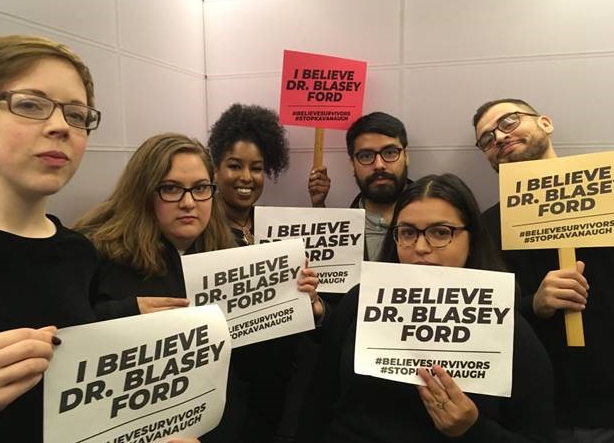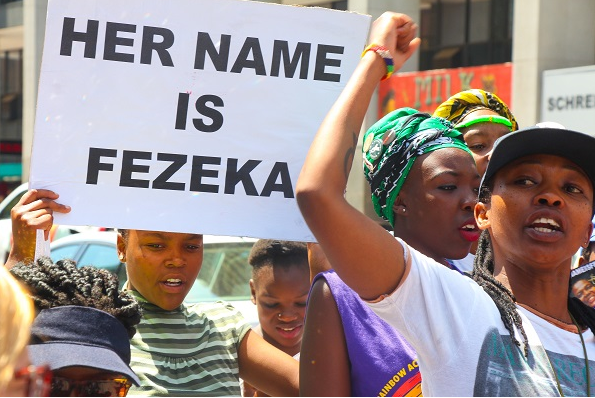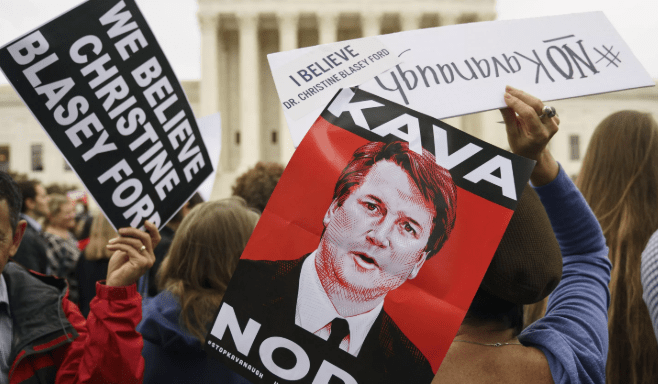We’re on the edge of our seats following the US Senate Judiciary Committee hearings where Dr. Christine Blasey Ford testified about the sexual violence she experienced at the hands of Supreme Court nominee, Brett Kavanaugh. We are listening with anger, fear, and anticipation expressed in a flurry of messages flying between us across continents.
In the political frenzy surrounding the hearing, the ugly intersections of power, sex, and violence are on raw public display. Whether in the US or elsewhere, the storyline is painfully familiar.
Some of us have seen this before with Anita Hill. Some remember the late Fezekile in South Africa, or Valentina Rosendo Cantu in Mexico, and many others – women and men – who broke the silence to speak about their sexual assaults in the face of backlash and shame.
And yet, we’re equally hopeful. The extraordinary mobilizations on social media and in the halls of the Senate are building a very different future. #MeToo, #BelieveSurvivors and the thousands of personal stories shared through #WhyIDidntReport give momentum to the tectonic shifts in our society that are essential for equality and dignity for all people. As Arundhati Roy said, “Another world is not only possible, she is on her way … I can hear her breathing.”
Below are some of our reflections:
“A friend sent me a Maureen Dowd op-ed of Anita Hill that confirms this sense of ‘the more things change, the more they stay the same.’ Oddly, this lacks even the basics of investigation – so the process in the judiciary committee is worse and more of a ‘he said, she said’ circus. But, the uprising and anger of women and men, boys and girls, is much more palpable, informed, and visible with social media: a resistance moment. So many younger generations aspiring to consent are less tolerant of the boys will be boys narrative to explain sexual violence.”
“I remember the Anita Hill hearings so vividly and how crushing it was when the all-male committee voted Clarence Thomas in, despite Hill’s brilliant and courageous testimony. I do think things have changed and I am hopeful that even if the men of the US Senate have not, #MeToo and so much other work has changed the world. I was proud to join over 2,200 other Yale women alumnae in signing a letter in support of Christine Blasey Ford and Deborah Ramirez.”

“Sexual violence is used as a mechanism of social control and repression of movements. In Mexico, the indigenous activist Valentina Rosendo Cantu demanded justice at the Inter-American Court for sexual torture by members of the army in one of the poorest and most militarized places in the country. Women have raised their voices against violence and found ways to protect and heal collectively.”
“I hope the fresh awareness makes it hard to say that men like Kavanaugh are just bad apples without also seeing the systemic nature of the problem. And that women can finally cast off the shame for all the ways we have been forced to navigate the ugliness of sexual violence and harassment, often at the expense of our own self-esteem, safety, and sanity. Time is up on that.”
“I have discomfort around how the justice system works, making women relive the abuse they have experienced. I have been on the stand before and I was made to feel like I was on trial. I stand with Dr. Christine Ford because I understand what it feels to be made to prove that you were violated. Whatever the outcome, it gives hope to other women everywhere that they too can come forward and speak out, and more importantly, that they will have the support and solidarity of other women.”
“This story has visibilized our interconnectedness and the solidarity among women which often goes unsaid. Survivors from all walks of life are legitimizing each other’s voices: The survivors of Larry Nassar, 332 girls who were sexually abused and silenced for years, are on Twitter calling out US Senators on behalf of Christina Blasey Ford. Monica Lewinski, who lost everything because a President abused his power over her, has spoken out. The #MeToo movement has organized nonstop to mobilize women to strike, march, and occupy government buildings. Even if we don’t get the results we want from this hearing, these voices give me hope. I know they will not be silent no matter what comes next.”

“With the world-wide #MeToo movement, we have entered a new phase in relation to the discussion around gender, sexual abuse, and the oppression of women in general, where silence is being broken and abuse is being socially dissected and condemned. At the same time, misogyny, sexism and conservatism are also advancing. So, we can feel the strength of both tides moving forwards and clashing into each other. The powerful energy that the #MeToo movement has generated has been very liberating and affirming, but it has also been very fierce and categorical. I think after this initial moment, we have many questions to think about, especially in relation to the new limits, criteria, and parameters that are being generated with this process and how to make them part not only of our cultures but also our justice systems. This is an open and ongoing discussion being carried out with many perspectives, voices, and emotions, which undoubtedly will allow us advance in the struggle to end sexual violence.”
“It seems that regardless of the details and particular context, there is always an agenda deemed more important than women’s right to control our bodies. The outrage is about the righteousness of Kavanaugh’s appointment, but it is really telling that the standards are so low for those responsible for the law and even lower for others.”
“Solidarity and strength with Dr. Ford. Courage to her, the many womxn who struggle to speak out, and all who come out in support. Let these actions continue to build peoples’ resolve in the US to fight against all forms of violence, regardless of who is said to be the victim.”


























